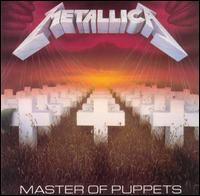Since the release of their first two albums, 1982's Kill 'Em All and 1984's Ride the Lightning, Metallica has been hailed as one of the most important thrash metal bands to come out of the United States, along with Slayer, Megadeth, Anthrax, Exodus, Testament, Suicidal Tendencies and many others.
Their third album, 1986's Master of Puppets, is now regarded as one of the finest metal albums in history, featuring the band's most progressive and diverse work compared to their previous releases, having faster or longer, thrash-oriented songs, and is cited as an influence by a number of many of today's metal bands. Unfortunately, the bad news was that after this album, their bassist Cliff Burton died when the band was involved in a tour bus accident in Sweden during a tour. After numerous auditions were held for a new bassist, Metallica replaced Burton with former Flotsam and Jetsam bassist Jason Newsted, who would play on the rest of the band's albums up to 1999's S&M, then join the Canadian thrash metal band Voivod.
On opening track "Battery," singer/guitarist James Hetfield sings of a war tactic as the agressor, not as something someone else is doing. The awesome, quintessential title track also speaks in the first person, personifying drug addiction. "Disposable Heroes" chillingly comments on the dehumanization and, well, disposability of soldiers during war, whether from the point of view of the martial authority ("bred to kill, not to care, do just as we say; finished here, greetings death, he's yours to take away") or the combatant himself ("I was born for dyiiiiiiiiiinnnng!"). Televangelists are regarded as an insidious disease in "Leper Messiah." The last song, "Damage Inc." has cruel visions of "crushing all" and "damage jackals ripping right through you"; the lyrics are almost cartoonish in their frankness and are hardly meant to be taken seriously (I think), but the song is no less sinister for all that.
Even when the album delves into a fictional topic among all its commentary on real-life horrors, it manages to be chilling. "The Thing That Should Not Be" broods on a Lovecraftian nightmare, a dark god, come to destroy or enslave the world. And on "Welcome Home," the passive becomes aggressive as a sanitarium inmate details his and his fellow inmates' cruel mistreatment at the hands of the establishment and then goes on to plan a desperate, violent escape.
Master of Puppets could very well be a thematic album, as the album title seems to apply to several songs. The title track speaks for itself of course, but the "Disposable Heroes" are the puppets of the "War Pigs" (in the words of Black Sabbath); the album's cover depicts this. The "Leper Messiah" could be considered the master of all the puppets he managed to brainwash into giving him money and adoration. And you could, in a fit of imagination, perhaps stretch the definition a bit. "The Thing That Should Not Be" is the master of the puppets who seek to conjure him and the rest of the world, if they succeed. Perhaps the inmates of Sanitarium are the puppets of the establishment - -- until, perhaps, they tear off their strings and wrap them around their "masters'" throats.
But I'm probably getting too carried away here. Let me end by saying that Metallica's darkest album is also arguably its best. The sound itself is dark and ominous and perfectly accentuates the lyrics and, perhaps most of all, by Hetfield's voice which has never sounded spookier, especially on "Battery" and "Master of Puppets." There's more of a sense of intimacy to this record. The album just succeeds, through great music and lyrics, to draw you into its darkness.
1986 sure was one of the finest years ever for metal. Other than Master of Puppets, Megadeth released Peace Sells, Slayer released Reign in Blood, Kreator released Pleasure to Kill, Dark Angel released Darkness Descends, Voivod released Rrröööaaarrr and the Mentors released Up the Dose.
Bottom line: I recommend you buy Master of Puppets, if you don't own it. Check it out. Buy it. Listen to it. Whatever.
